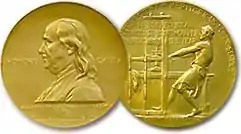2007 Pulitzer Prize
The Pulitzer Prizes for 2007 were announced on April 16, 2007.[1]
In November 2006, the Pulitzer Prize Board announced two changes that would apply to the 2007 awards:
- "online elements will be permitted in all journalism categories except for the competition's two photography categories, which will continue to restrict entries to still images."[2]
- a "category called Local Reporting will replace Beat Reporting as one of the 14 prizes in journalism"; the board explained that "while the local category replaces the Beat Reporting category that was created in 1991, the work of beat reporters remains eligible for entry in a wide range of categories that include—depending on the specialty involved— national, investigative, and explanatory reporting, as well as the new local category."[2]
Journalism
| Public service | The Wall Street Journal | "For its creative and comprehensive probe into backdated stock options for business executives that triggered investigations, the ouster of top officials and widespread change in corporate America." |  The gold medal awarded for Public Service in Journalism. |
| Breaking news reporting | Staff of The Oregonian, Portland, Oregon | "For its skillful and tenacious coverage of a family missing in the Oregon mountains, telling the tragic story both in print and online." | |
| Investigative reporting | Brett Blackledge of The Birmingham News in Alabama | "For his exposure of cronyism and corruption in the state's two-year college system, resulting in the dismissal of the chancellor and other corrective action." | |
| Explanatory reporting | Kenneth R. Weiss, Usha Lee McFarling and Rick Loomis of the Los Angeles Times | "For their richly portrayed reports on the world's distressed oceans, telling the story in print and online, and stirring reaction among readers and officials." | |
| Local reporting | Debbie Cenziper of The Miami Herald | "For reports on waste, favoritism and lack of oversight at the Miami housing agency that resulted in dismissals, investigations and prosecutions." | |
| National reporting | Charlie Savage of The Boston Globe | "For his revelations that President Bush often used "signing statements" to assert his controversial right to bypass provisions of new laws." | |
| International reporting | Staff of The Wall Street Journal | "For its sharply edged reports on the adverse impact of China's booming capitalism on conditions ranging from inequality to pollution." | |
| Feature writing | Andrea Elliott of The New York Times | "For her intimate, richly textured portrait of an immigrant imam striving to find his way and serve his faithful in America." | |
| Commentary | Cynthia Tucker of The Atlanta Journal-Constitution | "For her courageous, clear-headed columns that evince a strong sense of morality and persuasive knowledge of the community." | |
| Criticism | Jonathan Gold of LA Weekly | "For his zestful, wide-ranging restaurant reviews, expressing the delight of an erudite eater." | |
| Editorial writing | The editorial board of the New York Daily News | "For its compassionate and compelling editorials on behalf of Ground Zero workers whose health problems were neglected by the city and the nation." | |
| Editorial cartooning | Walt Handelsman of Newsday, of Long Island, New York | "For his stark, sophisticated cartoons and his impressive use of zany animation." | |
| Breaking news photography | Oded Balilty of The Associated Press | "For his powerful photograph of a lone Jewish woman defying Israeli security forces as they remove illegal settlers in the West Bank." | |
| Feature photography | Renée C. Byer of The Sacramento Bee, of California | "For her intimate portrayal of a single mother and her young son as he loses his battle with cancer." |
Letters, Drama and Music Awards
| Fiction | The Road by Cormac McCarthy (Alfred A. Knopf) |
| Drama | Rabbit Hole by David Lindsay-Abaire (TCG) |
| History | The Race Beat by Gene Roberts and Hank Klibanoff (Alfred A. Knopf) |
| Biography | The Most Famous Man in America by Debby Applegate (Doubleday) |
| Poetry | Native Guard by Natasha Trethewey (Houghton Mifflin) |
| General Nonfiction | The Looming Tower by Lawrence Wright (Alfred A. Knopf) |
| Music | Sound Grammar by Ornette Coleman |
Special Citations
- Ray Bradbury received an extraordinary citation "for his distinguished, prolific and deeply influential career as an unmatched author of science fiction and fantasy."
- John Coltrane received an extraordinary posthumous citation "for his masterful improvisation, supreme musicianship and iconic centrality to the history of jazz."
References
- The Pulitzer Prize Winners for 2007, from that organization's website
- Pulitzer Board Widens Range of Online Journalism in Entries, from the Pulitzer Prize website
External links
This article is issued from Wikipedia. The text is licensed under Creative Commons - Attribution - Sharealike. Additional terms may apply for the media files.